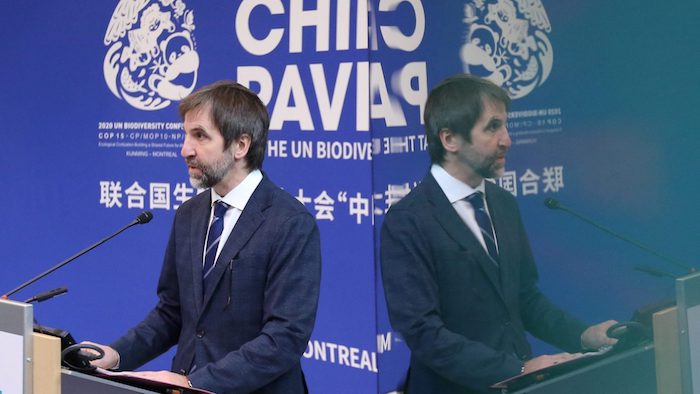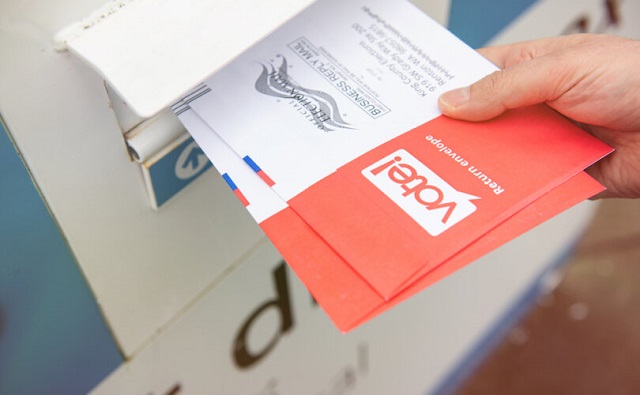Alberta
A Matter of Fact: Environment Minister Steven Guilbeault’s future view of Canada’s oil and gas sector is unrealistic

Canadian Minister of the Environment and Climate Change, Steven Guilbeault, speaks at the China pavilion during the United Nations Conference of the Parties (COP15) in Montreal, Quebec, on December 14, 2022. Getty Images photo
From the Canadian Energy Centre Ltd.
Canada could play a key role in lowering global emissions by unlocking our LNG industry and helping Asian countries replace coal
Federal Environment and Climate Change Minister Steven Guilbeault is continuing to plot a painful course toward a short-sighted phase out of Canada’s world class oil and gas sector based on an unrealistic view of world’s future energy mix.
In an interview with Euractiv, Guilbeault said he supports the phase out of unabated fossil fuels, those without the technology to minimize emissions, by 2050 to align with the International Energy Agency’s Net Zero Scenario, a path that is largely out of touch with the current global reality.
Based on that increasingly unlikely scenario, the minister said he anticipates Canada’s oil and gas sector will follow suit with a 50% to 75% reduction in the production of oil and gas by 2050, which would be devastating for our economy, hurt our economic allies, and make little to no progress towards reducing global emissions.
Here are the facts.
Fact: The IEA’s Net Zero Scenario is largely aspirational, not practical
Guilbeault’s vision of a massive global reduction of fossil fuel usage is growing even less likely amid a lingering energy crisis prompted by several years of declining investment in oil and gas followed by Russia’s invasion of Ukraine.
The fact is, this year the world will use more oil and more coal than any time in human history.
According to the IEA’s latest short-term outlook, global oil use will hit a record high of 102 million barrels per day this year and is expected to grow to 106 million barrels per day by 2028. Last week, OPEC forecasted that by 2045, global oil demand will reach 110 million barrels per day.
Meanwhile, demand for natural gas, particularly liquefied natural gas (LNG) is soaring.
By 2040, global LNG demand – driven primarily by growing Asian economies – is expected to reach 700 million tonnes, a more than 75 per cent increase from 2022. Demand for LNG is expected to outpace supply by the middle of this decade.
Relying on the IEA’s Net Zero scenario, Guilbeault said he believes oil use will decline to between 25-30 million barrels per day, a 75 per cent reduction. Rapid deployment of renewables, he said, would fill that void despite some significant hurdles that could hinder a sweeping transition.
The bottom line is pretty clear. In the IEA’s most likely scenario, oil and gas will still account for 47 per cent of the global energy mix in 2050, a reduction of 5 per cent from 2021. While the share of renewables will more than double, it is still expected only to account for 29 per cent of the world’s energy mix in 2050.
Fact: A rapid phase out of oil and gas would hurt Canada and its allies
Canada’s oil and gas sector is a critical part of our economy, supporting hundreds of thousands of jobs from coast-to-coast, including thousands of jobsin manufacturing, environmental, and financial services tied to the industry, especially in Ontario and Quebec.
A recent analysis by commodity data firm S&P Global focused specifically on the oil sands suggests that efforts to meet federal emissions targets for 2030 would likely force the industry to slash production by up to 1.3 million barrels per day.
According to the analysis, that could result in the elimination of between 5,400 and 9,500 jobs. With just over 54,000 oil and gas extraction jobs in Canada, that would mean the elimination of as much as 17% of the workforce.
In addition to jobs, the industry is also an economic bulwark, generating $168 billion in GDP in 2021, about 7.2 per cent of Canada’s economic activity. Oil and gas also accounted for nearly a third of Canada’s exports in 2021, injecting $140 billon into the economy.
Amid the ongoing global energy crisis, some of Canada’s international allies have turned to Canada to be a potential key supplier as they look for stable and responsible suppliers to replace Russian oil and gas.
The leaders of Germany and Japan made direct appeals to Canada to supply more LNG to help meet their energy needs.
Yamanouchi Kanji, Japan’s ambassador to Canada, made it clear that some of our Asian allies see Canada as a key player in the world’s future energy, particularly when it comes to LNG.
“The world is waiting for Canada,” he said earlier this year. “Canada can and should play a very important role to support the energy situation not only in Japan and South Korea, but the world.”
Fact: Reducing global emissions starts with Canadian natural gas
If Canada is truly serious about tackling global greenhouse gas emissions, we could make a much bigger impact by supplying energy-hungry Asian countries with some of the cleanest LNG on the planet to replace coal.
Climate change is a global issue, not a local one.
Despite being one of the world’s largest energy producers, Canada is still only responsible for about 1.6 per cent of total global emissions.
Developing Asian counties, particularly China, have turned to coal to help power their growing economies. A switch to natural gas to generate power reduces emissions by 50 per cent on average, according to the IEA. Canadian natural gas shipped as LNG could perform even better, reducing emissions from coal by about 65 per cent, according to Energy for a Secure Future.
With analysts expecting world LNG demand to double over the next two decades, Canada could make a real measurable impact on lowering global emissions by unlocking its LNG potential.
A recent study by Wood Mackenzie found that Canadian LNG exports could reduce net emissions in Asia by 188 million tonnes per year through 2050. Put another way, that would be the annual equivalent of removing the emissions of all vehicles on Canadian roads, or wiping out nearly three time’s B.C.’s total emissions.
Meanwhile, a coalition of six companies representing 95 per cent of Canada’s oil sand production have jointly committed to achieve net zero emissions by 2050. The Pathways Alliance is looking to harness emerging technology like carbon capture and storage as well as small modular nuclear reactors to reach that target.
The reality is that if Canada significantly curtails its oil and gas industry, other national producers, some of which lack Canada’s commitment to democratic ideals and the environment, will fill that void. This could see bad actors like Russia continue to maintain a strategic and economic advantage over Europe by maintaining European reliance on its energy.
Fact: Phasing out oil and gas would hurt Indigenous communities
Over the last decade, Indigenous communities have emerged as key players in Canada’s energy sector, allowing First Nations in many cases to create intergenerational opportunity for their people.
From pipelines to LNG terminals, dozens of Indigenous communities have entered into ownership agreements on major oil and gas projects.
In B.C., 16 First Nations will acquire a 10 per cent stake in the Coastal GasLink pipeline once it’s completed later this year. In Alberta, another 23 First Nation and and Métis communities are now approximately 12 per cent owners of seven operating Enbridge oil sands pipelines, the largest Indigenous energy transaction ever in North America.
And in northwest B.C., the Haisla Nation is 50 per cent owner of the proposed Cedar LNG project, which would be the first Indigenous-owned LNG terminal in the world.
“When Europeans, Asians and Americans think of Canada’s Indigenous peoples, they often think we oppose all energy development. We aren’t victims of development. Increasingly we are partners and even owners in major projects,” Haisla Nation Chief Councillor Crystal Smith said during an April press conference after leading a delegation of Indigenous leaders to meet key international diplomats.
Indigenous employment in Canada’s oil and gas sector has continued to grow, rising by more than 20 per cent since 2014 to reach an estimated 10,400 jobs in 2020.
Indigenous-owned businesses also benefit from the industry, with three major projects – the Trans Mountain Expansion, Coastal GasLink, and LNG Canada – spending some $9 billion with Indigenous- and locally-owned businesses.
Alberta
Former senior financial advisor charged with embezzling millions from Red Deer area residents

News release from Alberta RCMP
Former senior financial advisor charged for misappropriating nearly $5 million from clients
On April 4, 2024, the RCMP’s Provincial Financial Crime Team charged a Calgary resident for fraud-related offences after embezzling millions of dollars from his clients while serving as a senior financial advisor.
Following a thorough investigation, the accused is alleged to have fraudulently withdrawn funds from client accounts and deposited them into bank accounts he personally controlled. A total of sixteen victims were identified in the Red Deer area and suffered a combined loss of nearly $5 million.
Marc St. Pierre, 52, a resident of Calgary, was arrested and charged with:
- Fraud over $5,000 contrary to section 380(1)(a) of the Criminal Code; and,
- Theft over $5,000 contrary to section 344(a) of the Criminal Code.
St. Pierre is scheduled to appear in Red Deer Provincial Court on May 14, 2024.
“The ability for financial advisors to leverage their position to conduct frauds and investment scams represents a significant risk to the integrity of Alberta’s financial institutions. The investigation serves as an important reminder for all banking clients to regularly check their accounts for any suspicious activity and to report it to their bank’s fraud prevention team.”
- Sgt. John Lamming, Provincial Financial Crime Team
The Provincial Financial Crime Team is a specialized unit that conducts investigations relating to multi-jurisdictional serious fraud, investments scams and corruption.
Alberta
Political parties will be part of municipal elections in Edmonton and Calgary pilot projects

Strengthening Alberta’s local elections
Alberta’s government is introducing legislation to ensure Albertans can rely on transparent, free and fair elections, and municipally-elected officials have clearer accountability measures.
In a democratic society, Albertans expect their local elections to be free and fair, and their elected officials to be held to account by clear rules that govern their local councils. The Municipal Affairs Statutes Amendment Act proposes amendments to the Local Authorities Election Act (LAEA) and the Municipal Government Act (MGA) to add greater transparency to local election processes and ensure local councils and elected officials continue to remain accountable to the citizens who elected them.
“Our government is committed to strengthening Albertans’ trust in their local governments and the democratic process that elects local leaders. The changes we are making increase transparency for Alberta voters and provide surety their votes will be counted accurately. We know how important local democracy is to Albertans, and we will work with local authorities to protect and enhance the integrity of local elections.”
Local Authorities Election Act
Albertans expect free and fair elections and that’s why it’s important we strengthen the rules that govern local elections. To strengthen public trust in local elections, Alberta’s government will eliminate the use of electronic tabulators and other automated voting machines. All Albertans should be able to trust the methods and results of local elections; requiring all ballots to be counted by hand, clarifying rules and streamlining processes for scrutineers will provide voters greater assurance in the integrity of the results.
All eligible Albertans should be able to vote in local elections without impediment. Alberta’s government will limit the barriers for eligible voters to cast a ballot by expanding the use of special ballots. Currently, special ballots can only be requested for very specific reasons, including physical disability, absence from the municipality, or for municipal election workers. By expanding the use of special ballots, the government is encouraging more voter participation.
Amendments in the Municipal Affairs Statutes Amendment Act would increase transparency in local elections by enabling political parties at the local level. Political parties would be enabled in a pilot project for Edmonton and Calgary. The act will not require candidates to join a political party in order to run for a local or municipal office, but will create the opportunity to do so.
In addition, proposed changes to the Local Authorities Election Act would allow municipalities the option to require criminal record checks for local candidates, thus increasing transparency and trust in candidates who may go on to become elected officials.
Municipal Government Act
The role of an elected official is one with tremendous responsibility and expectations. Changes proposed to the Municipal Government Act (MGA) will strengthen the accountability of locally elected officials and councils. These include requiring mandatory orientation training for councillors, allowing elected officials to recuse themselves for real or perceived conflicts of interest without third-party review and requiring a councillor’s seat to become vacant upon disqualification.
If passed, the Municipal Affairs Statutes Amendment Act will also unlock new tools to build affordable and attainable housing across Alberta. Proposed amendments under the MGA would also create more options for municipalities to accelerate housing developments in their communities. Options include:
- Exempting non-profit, subsidized affordable housing from both municipal and education property taxes;
- Requiring municipalities to offer digital participation for public hearings about planning and development, and restricting municipalities from holding extra public hearings that are not already required by legislation; and
- Enabling municipalities to offer multi-year residential property tax exemptions.
Municipal Affairs will engage municipalities and other partners over the coming months to hear perspectives and gather feedback to help develop regulations.
Quick facts
- The LAEA establishes the framework for the conduct of elections in Alberta municipalities, school divisions, irrigation districts and Metis Settlements.
- The MGA establishes the rules governing the conduct of local elected officials once on council, as well as the overall administration and operation of municipal authorities in Alberta, including any policy those authorities may wish to implement.
Related information
-

 Automotive22 hours ago
Automotive22 hours agoThe EV ‘Bloodbath’ Arrives Early
-

 CBDC Central Bank Digital Currency13 hours ago
CBDC Central Bank Digital Currency13 hours agoA Fed-Controlled Digital Dollar Could Mean The End Of Freedom
-

 Addictions2 days ago
Addictions2 days agoWhy can’t we just say no?
-

 Business1 day ago
Business1 day agoHonda deal latest episode of corporate welfare in Ontario
-

 espionage1 day ago
espionage1 day agoOne in five mail-in voters admitted to committing voter fraud during 2020 election: Rasmussen poll
-

 Brownstone Institute12 hours ago
Brownstone Institute12 hours agoThe Numbers Favour Our Side
-

 Frontier Centre for Public Policy9 hours ago
Frontier Centre for Public Policy9 hours agoHow much do today’s immigrants help Canada?






